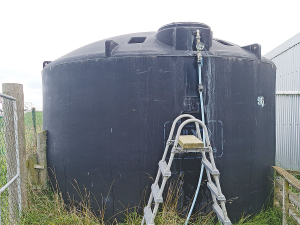Missed a beat?
OPINION: Did the Coalition Government miss a beat when picking a new panel to advise on the methane emissions target? Some farmers think so.
 A call has been made to exempt all rural water schemes from the Government's proposed Three Waters reforms.
A call has been made to exempt all rural water schemes from the Government's proposed Three Waters reforms.
Rural water schemes need to be exempted from the Government's proposed Three Waters reforms.
That's the belief of West Otago farmer and member on the Glenkenich rural water scheme Hugh Gardyne. In a submission to the Rural Water Supplies Technical Working Group on the impacts of the Three Waters reforms, Gardyne says, "the objectives of virtually every stratum of Three Waters reform are contrary to the achievements and intent of rural water schemes".
He argues that because rural water schemes (RWS) vary so much, it is so impossible to get consensus and "one size does not fit all".
The working group was set up by Local Government Minister and architect of the reforms Nanaia Mahuta to work with officials from the Department of Internal Affairs (DIA) and Taumata Arowai to develop policy options and advice in respect of rural community schemes around the new water entities proposed in her Three Waters reforms. It was expected to report back to DIA at the end of April.
As part of the reforms, drinking water quality safeguards are being extended to all drinking water suppliers, including small rural suppliers.
However, concerns have been raised that this will place pressure on rural supplies and could lead to these schemes being stopped or altered, leaving some communities without a service.
Gardyne argues that despite the historic subsidies, local rural water schemes are self-financed, self-funded and individually rated. "Ownership confers rights and massaging the notion that ownership will be held via some yet-to-be determined share structure - subject to the whim of this or a future minister - is insulting to the founders of RWS that envisaged local ownership, local control for longstanding local benefits.
"Ownership belongs to users. That aspect needs [to be] remedied. Ownership should remain with the RWS in perpetuity."
Gardyne adds that unless the working group "stands united opposing the direction rural water is headed, small rural schemes will get swallowed up in this process".
The submission accuses the working group accuses the working group of ignoring or accepting Mahuta's intent, which it claims "is co-governance and equal representation by iwi".
It adds that a veto in favour of non-elected members (iwi) will scuttle any well-argued structure based on democracy.
"As a member on the Glenkeich RWS, it is hard enough getting timely, accurate information from our local council, without working through the five tiers of bureaucracy suggested in the current proposal," Gardyne says.
"The submisson states that all rural water schemes ask for is that their local council support them with technical and professional advice, complementing the competencyof the elected scheme members."
He further argues that local knowledge is invaluable.
"The comparative simplicity with which rural schemes now operate - with already significant overheads charged by TLAs - will just get more costly and more complicated under the proposed reforms."
Gardyne's submission concludes that all rural water schemes should be removed from the proposed Three Waters reforms.
"The specific needs of the many rural communities and a fuller understanding of the uniqueness and purpose of rural water schemes, be it only for stock water or some potable component, needs to be respected by the Minister, the DIA and the working group members," he says.
"RWS are assets not chattels and DIA, councils and the working group have no moral right or authority to transfer them to a WSE structure without users' consent."
Greenlea Premier Meats managing director Anthony (Tony) Egan says receiving the officer of the New Zealand Order of Merit (ONZM) honour has been humbling.
Waikato dairy farmer Neil Bateup, made a companion of the New Zealand Order of Merit (CNZM) in the New Year 2026 Honours list, says he’s grateful for the award.
Another Australian state has given the green light to virtual fencing, opening another market for Kiwi company Halter.
Farmer interest continues to grow as a Massey University research project to determine the benefits or otherwise of the self-shedding Wiltshire sheep is underway. The project is five years in and has two more years to go. It was done mainly in the light of low wool prices and the cost of shearing. Peter Burke recently went along to the annual field day held Massey's Riverside farm in the Wairarapa.
Applications are now open for the 2026 NZI Rural Women Business Awards, set to be held at Parliament on 23 July.
Ravensdown has announced a collaboration with Kiwi icon, Footrot Flats in an effort to bring humour, heart, and connection to the forefront of the farming sector.